5 things white people can do to start making the fediverse less toxic for Black people
Anti-Blackness is a long-term problem in the fediverse. Now's a good time to start changing that.
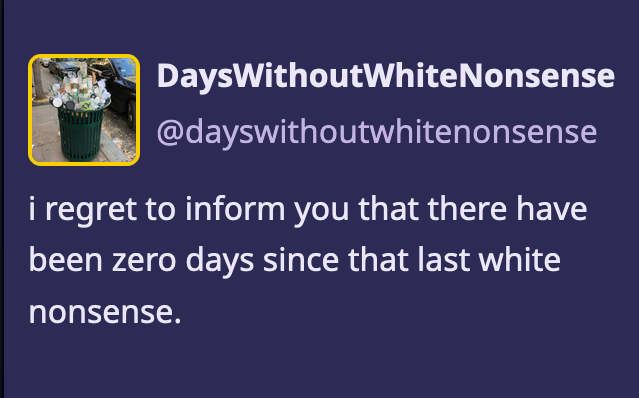
Join the discussion on infosec.exchange and lemmy.blahaj.zone!
Contents
- Intro
- 1. Listen more to more Black people – and amplify their voices
- 2. Think before you post
- 3. Call in, call out, and/or report anti-Blackness when you see it
- 4. Support Black people and Black-led instances and projects
- 5. Approach it intersectionally
- And that's not all ...
- A note to people who are neither Black nor white
- Appendix: Common mistakes to avoid
- Appendix: Blocklist resources for moderators
- Notes
Last updated August 19. See the Update Log below for details.
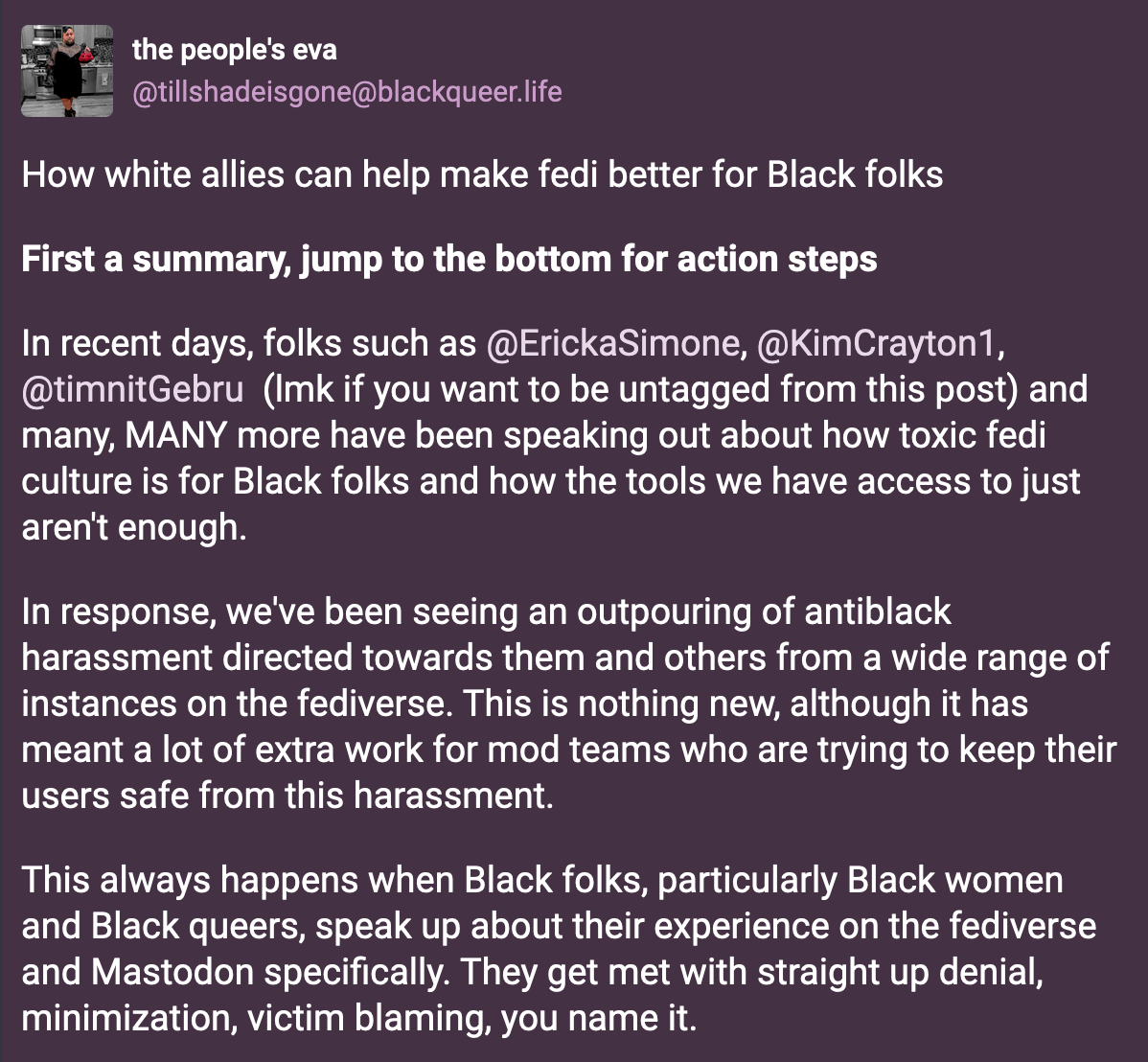
Anti-Blackness – beliefs, attitudes, actions, practices, and behaviors of individuals, institutions, software, and systems that devalue, minimize, and marginalize the full participation of Black people across the world1 – is a long-term problem in the fediverse. Dr. Johnathan Flowers' The Whiteness of Mastodon and Twitter vs. Mastodon podcast, Marcia X and Ra’il I'Nasah Kiam's Blackness in the Fediverse, and the links in Dogpiling, weaponized content warning discourse, and a fig leaf for mundane white supremacy have some of the history. While these links focusing primarily on Mastodon, currently the largest instance (server) in the Fediverse, the problem is broader – see for example the draft of Ah, Lemmy: Racism and Denial in the Threadiverse.
Every time things flare up, along with the harassment and denial and victim blaming and hate, there's also lot of hand-wringing about how we should be better than this. And then things go back to how they always are. White people in the fediverse collectively should indeed be better than this ... but in practice, we are not.
Now's a good time to start changing that and start making the fediverse less toxic to Black people.2
Here are 5 things white people can do to help.
- Listen more to more Black people – and amplify their voices
- Think before you post
- Call in, call out, and/or report anti-Blackness when you see it
- Support Black people and Black-led instances and projects
- Approach it intersectionally
1. Listen more to more Black people - and amplify their voices
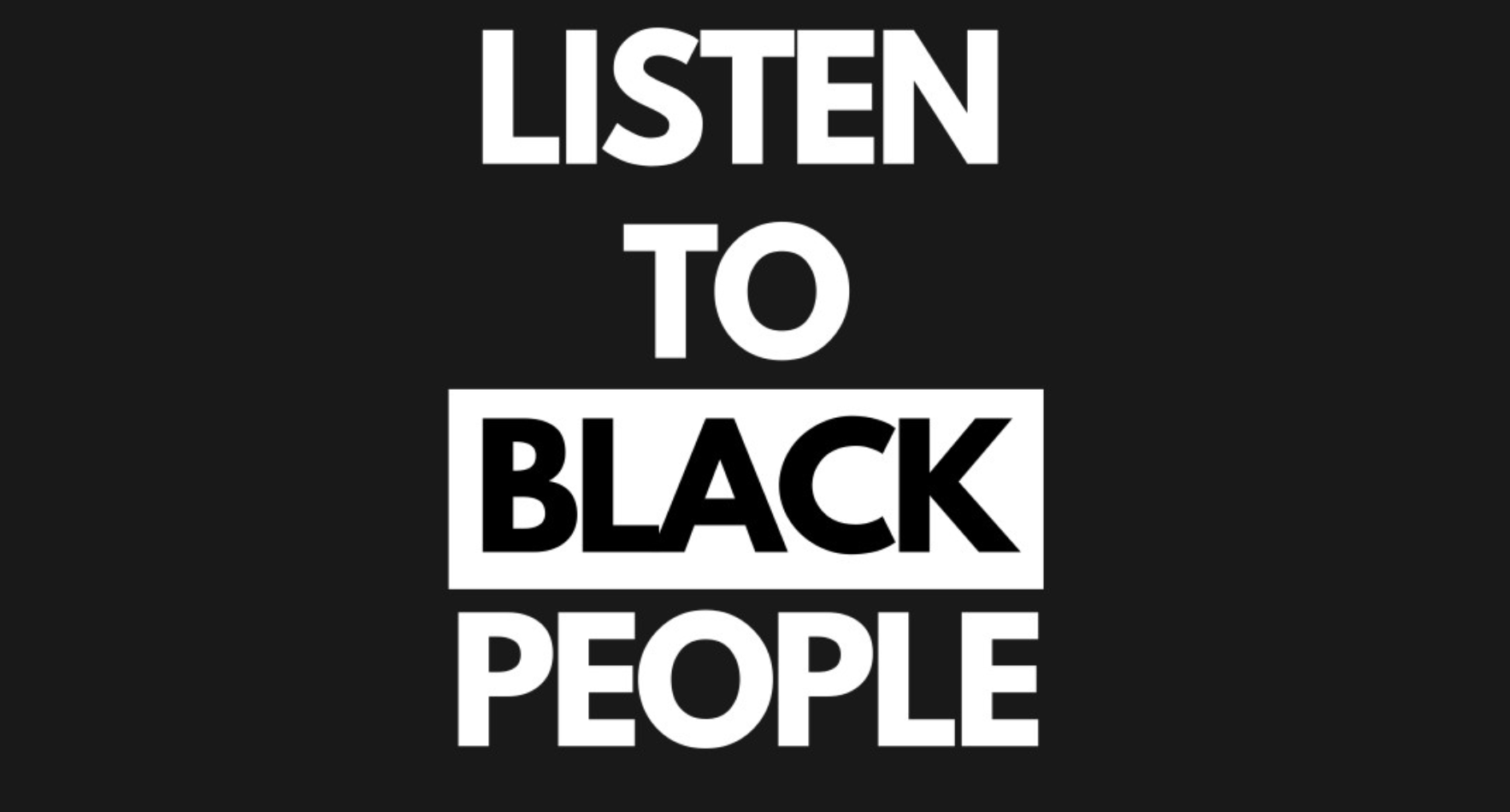
Listening to Black people is an important first step in recognizing and understanding the fediverse's (and society's) problems with anti-Blackness. Hashtags like #BlackMastodon and #BlackAugust, and groups like blackfedi@fedigroups.social are good places to start if you're using Mastodon, GoToSocial, or other microblogging fediverse software. If you're on a platform like Lemmy which doesn't yet have similar hubs, it's more challenging.
One good option, no matter what platform you're on, is to follow independent news sites like The 19th News and Prism Reports. Other social networks, news aggregators, and search engines are also good sources for articles and videos by Black people. If you haven't seen anybody else has posted them to fediverse yet, share them yourself!
You can also help others listen to more Black people by amplifying Black voices – for example, by boosting, upvoting, resharing, and cross-posting. There's a caveat here though: not everybody wants their posts amplified. So there are some situations where you shouldn't apmplify, for example if it's an account with relatively-few followers, if somebody's not trying to call attention to their post and/or is saying something as part of a conversation with friends. When in doubt, it's better not to amplify. Still, if it's a post that's clearly written for a broad audience, an article or video created by a Black person, or a quote from a Black person in a published article or video ... amplify away!
Keep in mind that Black communities aren't monolithic, so don't just listen to and amplify a few high-profile US-based accounts. There are Black anarchists and Blak communists as well as Black capitalists, Black conservatives as well as Black progressives and leftists. So make sure you're getting a range of perspectives – including Black Women, trans, queer, and non-binary Black people, disabled Black people, Afro-Indigenous people, and Black people from Africa.
2. Think before you post

If you're white, you're almost certainly not an expert on anti-Blackness and other forms or racism – on the fediverse or more generally. This means that your ideas and suggestions are almost certainly not new, and you're going to have the same questions that have been asked many many times before. As Ijeoma Oluo says in Welcome To The Anti-Racism Movement — Here’s What You’ve Missed:
"Every idea you have for how we can better fight racism has already been discussed.... Free, individualized education is not a thing we do anymore."
Even if you're asking questions because you sincerely want to know, or you're suggesting good ideas, it's very often not particularly helpful. In fact, since many Black people hear the same questions and suggestions again and again so often that it's very irritating. And let's face it, many times they're not actually particularly good questions or ideas – or people express them in an unfortunate way.
So if you're about to post about a topic related to anti-Blackness (or race in general), especially if it's a reply to a post or thread from a Black person, stop and ask yourself whether you're actually adding anything to the conversation.
- If you've got a question, spend some time looking for the answers – or make a followers-only post and ask – before expecting people to answer it for you.
- If you've got a suggestion, ask yourself if this is the time or place for it.
- Double-check to see that others haven't already said something similar. Remember that the fediverse is quirky and you may not be seeing all the replies people have made; make sure to check the original post.
It's also worth looking it over to make sure you haven't unintentionally said something anti-Black (or more generally racist). For example, stop saying there isn't racism on the fediverse or asking Black people for evidence of anti-Blackness. Dozens of Black people have shared the evidence repeatedly. If you want to see specific examples, do the work yourself to find them rather than expecting Black people to do free, individualized education for you. As Michał "rysiek" Woźniak says in an excellent short thread
"Yes, doubting lived experience of Black, Indigenous, Asian, Arab, etc. people is itself racist
Just don't.
And yes, asking for proof is doubting that lived experience."
Appendix: Common mistakes to avoid goes into a bit more detail on this, and also covers several other all-too-frequent unfortunate word choices.
Very often, after this initial reflection, you'll decide not to post. That's okay!
If you do decide to post, take the time to phrase it well. Double-check your wording to see you're not inadvertently using problematic language; as the quote from Andrea at the start of section #4 points out, even well-intentioned expressions of sympathy can come across as hand-wringing and be microagressive. When I post on particularly contentious topics, I'll often ask one or more friends for feedback before posting (although please don't do this with your Black friends unless they've offered – it's asking them to educate you for free).
Of course, the combination of deciding not to post in some circumstances, and taking more time to think and work on the wording of the posts you do make, means that you'll post less ... but that's not a bad thing. The posts you make will be higher quality, and are likely to lead to better discussions. And, posting less also opens up space for you to amplify more Black voices.
3. Call in, call out, and/or report anti-Blackness when you see it
"Despite white people being less likely than people of color to believe that social media is useful for advocating on behalf of marginalized groups (Anderson et al., 2018), research shows that white people hold unique communicative power to fight against racism on social media (Chaney et al., 2020; Lane, Coles, et al., 2019; Munger, 2017).... [T]he goal of responding to a racist post is not to persuade its author to abandon racist views, but rather to signal that expressing such views will not be tolerated."
– Making the impossible possible? Framing confrontations of racism on social media as norm-setting, Stewart M. Coles and Daniel Lane
Especially if it's the first time you've seen anti-Blackness from somebody and it seems like it was unintentional, very often a polite call in as a reply or direct message is a good option. An unintentional mistake can still cause harm (Impact > intent), but it's more likely to be a good learning opportunity. Let them know they've said something unfortunate, explain why, and possibly follow up with them one-on-one or in a small group. For more on this tactic, see Harvard Diversity Inclusion and Belonging's Calling In and Calling Out Guide, Tiffany Jewel's When to Call Someone Out or Call Them In Over Racist Behavior (with illustrations by Aurélia Durand, an excerpt from This Book is Anti-Racist: 20 Lessons on How to Wake Up, Take Action and Do The Work), Loretta Ross' Don't Call People Out, Call Them In video, and her book Calling In,
If it's egregious, or somebody doubles down instead of fixing it, or they have a pattern of unfortunate remarks, then report it to the moderators – and potentially call them out more loudly. If you're on Mastodon, you can also report it to the admins of their instance; that's a good idea if the admin or moderator of the other instance wants to deal with it, but a bad idea if they're hostile (in which case it's a best a waste of time and may open you up to harassment).
If you're a moderator, it's especially important to take action on anti-Blackness when somebody reports it – or when you notice it yourself. If the comment is particularly egregious, delete it and consider banning the user (or at least give them a formal warning). Otherwise, especially if it's somebody on your own instance, you may want to start by calling them in. If somebody doesn't want to learn, you'll need to take stronger action.3 As social.coop's Statement from moderation team involving recent racism reports illustrates, in situations when anti-Blackness from somebody on your instance has gotten a lot of visibility, it's important to signal that your instance is committed to dealing with the problem.
Moderators can also proactively reduce the amount of anti-Blackness by making sure their instance has a good blocklist (aka denylist). See the blocklist resources in the appendix for more.
Dr. Kim Crayton, author of Profit without Oppression, discusses a recent discussion with the Mastodon gGmbH CEO in Day 214 of The Future Is FREE. Shop for The Future is FREE merch here, and you can sponsor Dr. Crayton here.
The fediverse's anti-Blackness also shows up in the software. For example, Mastodon's default settings leave new instances open to Nazis and "freeze speech" shitposters ... the kind of people who just loooooove greeting people with the racist posts and defend hate speech and harassment by claiming it's just "free speech." As well as better defaults, providing everybody (especially moderators) better tools to protect themselves and others can make a big difference Unfortunately, software projects like Mastodon and Lemmy haven't ever prioritized it. This impacts everybody – and especially impacts people who targets of hate, bigotry, and harassment. Like Black people for example!
So when you see situations where developers are ignoring safety or concerns from Black users and admins, treat it like you would any other example of anti-Blackness.
To be clear, the underlying problems are cultural. Still, technology can make a difference; see Mastodon and today’s fediverse are unsafe by design and unsafe by default and Steps towards a safer fediverse for more.
4. Support Black people and Black-led instances and projects
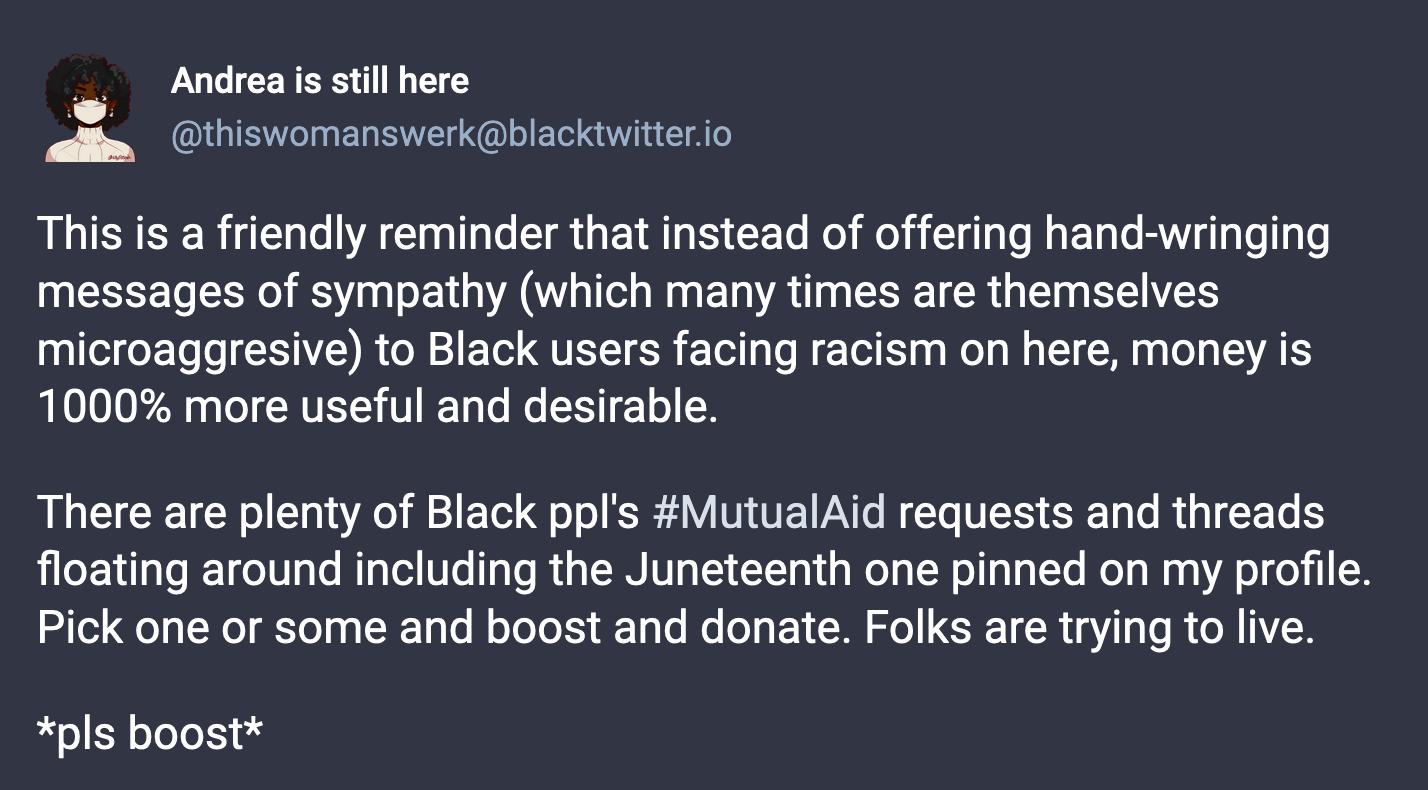
Many Black people in the fediverse promote or sell art, music, books, crafts, and newsletters. Many have "looking for a job" posts, crowdfunding or donation links, or threads like Andrea's Juneteenth post collecting requests from others. If you see a post you like, or somebody who's been treated shabbily by others in the fediverse and you feel bad about it, check their profile and pinned and recent posts to see how you can help. If you're listening to Black people, you'll also see lots of other opportunities. Whether or not you have funds to spare, you can help by boosting and promoting people's work, fundraisers, job search requests, etc.
There are also a lot of other ways to support Black people on the fediverse. For example:
- The #MutualAid hashtag is a good place to find people who need support.
- Black-led instances like blackqueer.life, diaspora.im, and blacktwitter.io play an important role in the fediverse – and need support.
- Black-led software projects like Awujo (proposed in Ro's A Case for Community) that "prioritize safety, accessibility, and ease of use, managed by a consensus of diverse voices" can play an important role in addressing the fediverse's lack of safety for everybody ... but the software won't write itself.
5. Approach it intersectionally4
"Intersectional analysis is key to dismantling white supremacy"
– No Single-Issue Politics, Only Intersectionality: An Interview With Kimberlé Crenshaw
Anti-Blackness isn't the fediverse's only problem. Misogyny, transphobia and other forms of anti-2SLGBTQIA+ bigotry5 , anti-Indigeneity, ableism, Islamophobia, antisemitism ... the list goes on. As well as being problems in their own right, all of these other dimensions of oppression compound the fediverse's anti-Blackness. And people at the intersections experience unique forms of oppression.
Misogynoir – a term originally coined by Dr. Moya Bailey in 2008, describes the ways anti-Black and misogynistic representation shape broader ideas about Black women and gender-expansive people (especially in social media) – is one important example of intersectional oppression. As Dr. Kay Coghill says in What is Misogynoir? A deeper look into the anti-black racism and sexism that impacts Black Women and Black nonbinary, agender,and gender-variant folks,
"Misogynoir is vast and shows up more frequently than we may realize, and it has impacted Black women and Black nonbinary, agender, and gender-variant folks for centuries, but that does not mean that it cannot be mitigated."
Calling all non-Black people: Interrupting Misogynoir6, by Dr. Heliana Ramirez and Jaya Mallik, is an excellent recent resource; if you've got a Linked In account, check out the panel discussion here. Dr. Bailey's book Misogynoir Transformed: Black Women’s Digital Resistance goes into more detail. Similarly, transmisogynoir describes the intersection between transphobia, misogyny, and anti-Black racism specifically; Ashlee Maree Preston's The Anatomy of Transmisogynoir is a good introduction.
Of course, all of these dimensions of impressions are also complex issues, and the of how things manifest details can be very different, but the basic framework in #1-#4 of listening more, being more thoughtful about posting, intervening when you see something, and supporting people is quite general. For example, sections #2 and #3 point to how to make progress on Mastodon's notorious reputation for "reply-guy-ism" – which, while bad in general, is a lot worse for Black women and other women and femmes of color.
So please pay attention to these dynamics as well, and make sure you're listening to and supporting Black women, trans and queer Black people, and disabled Black people as well as Black guys and cis, straight, abled Black people.
The good news is that taking this intersectional focus will make the fediverse less toxic for everybody. As the Combahee River Collective said in 1977
"If Black women were free, it would mean that everyone else would have to be free since our freedom would necessitate the destruction of all the systems of oppression."
And that's not all ...
"So you want to talk about race" with Ijeoma Ulou and Dr. Cherisee Jones-Branch
Of course, these aren't the only things that need to happen to make the fediverse less toxic for Black people.
It's also vital to do the work to examine and make progress on your own biases, assumptions, habits, and other forms of anti-Blackness – which we all have. Ijeoma Oluo's Welcome To The Anti-Racism Movement — Here’s What You’ve Missed is a very good introduction. Her book So You Want to Talk About Race goes into more detail, as do her videos including the above. I also found Dr. Crystal Fleming's How to Be Less Stupid About Race helpful, and she's got some excellent videos too.
Dr. Crystal Fleming, How to Be Less Supid About Race, from Washington State University's Martin Luther King program
If those don't work well for you, there are lots of other good options out there as well – although reading and watching videos isn't enough, you have to put them into practice. Which isn't easy!
"You will get better at this, but at first you will fuck up a lot, and you will always fuck up a little.... You are here because you are a decent human, and because you are a decent human you are going to feel pretty shitty when you fuck up.... You will need to get used to the pang of guilt from realizing you have fucked up and it has hurt people. Because it will hit you again and again."
– Welcome To The Anti-Racism Movement — Here’s What You’ve Missed
When you do make a mistake, and somebody calls you in or out, the first step is to acknowledge and apologize. Resist the natural urge to be defensive – doubling down will only make things worse. Then, make amends. If you've made an unfortunate post, editing it is a good first step (and usually a better option than deleting the post, which makes it looks like you're trying to hide the fact that you screwed up).
Speaking of which, I'm sure I've made mistakes here – it's a very challenging subject to write about, and I too have spent my entire life in environments where anti-Blackness is normalized and (just like everybody else) am still not always aware of when I'm falling into it.
Thanks to everybody who gave me helpful feedback on the draft, but I've almost certainly found new ways to screw up in this current version. So, my apologies in advance; please call me in or out, as you see fit! I've linked to various discussions above, or you can DM me at @jdp23@blahaj.zone, @thenexusofprivacy@infosec.exchange, or @jdp23.bsky.social.
A note to people who are neither Black nor white
While anti-Blackness doesn't only come from white people, as a white person, I'd be out of my lane if I tried to tell you how to address anti-Blackness in your communities. For that matter, advice originally meant for white people often needs to be adapted to work for people of color. So while hopefully these recommendations may point in useful directions for you as well, maybe they don't – or maybe they're just a starting point that's missing important perspectives.
If anybody wants to use some or all of this material as a basis for posts speaking to other demographics, this post is Creative Commons licensed so you can cut-and-paste modify, or remix it however you ant it as long as you cite this as a source and allow your work to be reused (see the Licensing section on the About page for details). If you're thinking of doing something like that, I'm happy to talk or potentially even collaborate if you're interested, so hit me up.
Conversely, while I focused on anti-Blackness here because being too general risks losing specificity, other forms of racism are also big problems in the fediverse. So if you'd like to use some or all of this material as a basis for posts about what people can do about other forms of racism in the fediverse, that'd be great too! Again, if you're thinking about this and want to talk more, please reach out.
Appendix: Common mistakes to avoid
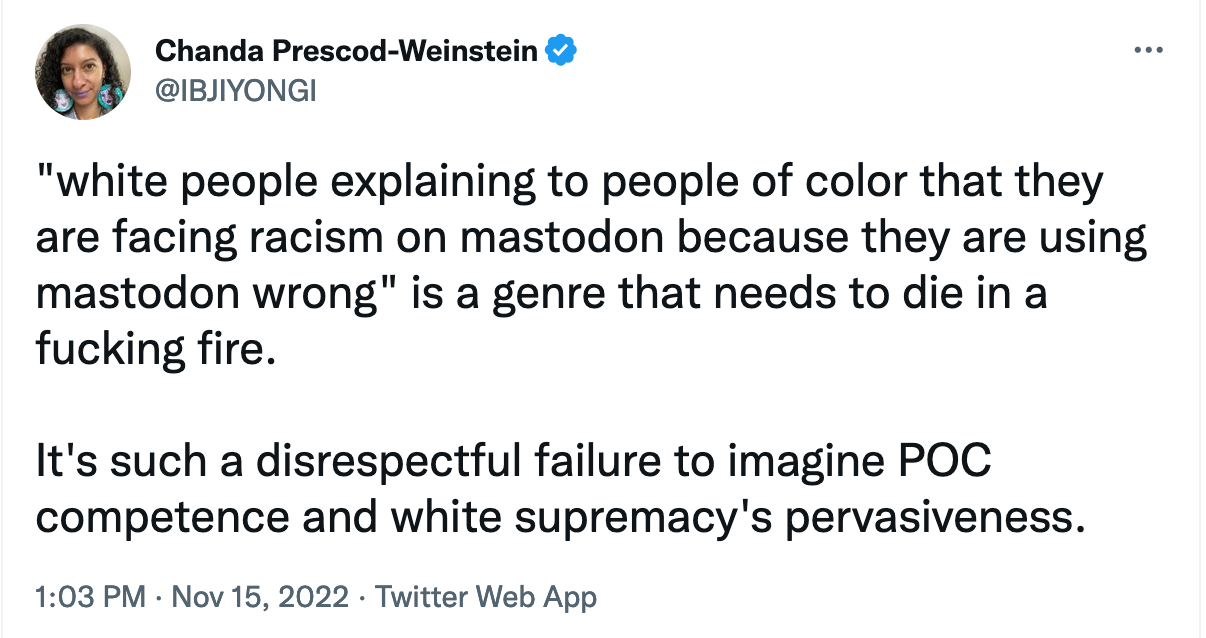
To make things concrete, here are some specific examples I've heard repeatedly from Black people:
Stop saying it's less racist here – or worse, "I haven't seen any racism here"
It's there, you're just not seeing it. For one thing, on Mastodon, a lot of harassment takes place in followers-only posts or DMs, which means it's only visible to the person being targeted. If you're on a well-moderated instance, racist posts not specifically directed at you might well be deleted before you see them. And if you're not following Black people, you're not going to see their posts about racism.
Still, those aren't the only dynamics.
"A function of systemic racism is that it is often invisible to white people, in part because the entertainment and news media, educational systems, political and moral ideologies, even the church are all based on the belief that white opinions, white experiences, and white definitions are primary and “true.”
– Overt and Covert Racism, R-Squared
Anti-Blackness and racism are so pervasive and normalized (on social networks and in society as a whole) that many white people don't even notice its. There were been several spectacular examples of this in discussions related to this post on Lemmy: people saying they haven't seen any racism on Lemmy – in the same threads with egregious comments and other more helpful commenters highlighting patterns of anti-Blackness on Lemmy. Ah, Lemmy. But it's not just Lemmy, stuff like this happens on Mastodon too.
Stop saying "I don't see color" or other variants on "I don't care about race, I treat everybody the same"
As a helpful commenter on Lemmy responded to somebody saying this, "tl;dr there’s no racism problem because you see everyone as a white man by default." Fitchburg State's What Does Racism Look Like? Colorblindness page has a short overview on why statements like this are so problematic; Eduardo Bonilla-Silva's Racism without Racists: Color-Blind Racism and the Persistence of Racial Inequality in America goes into detail.
Stop telling Black people that they'll experience less racism if they change instances
It's certainly true that some instances are better moderated than others. Still, no matter your intent, by saying this you're putting the burden on Black people to deal with anti-Blackness – and implying that the moderators of their instance are doing a bad job, which may not be true (in which case it's an example of the victim-blaming Dr. Gebru talked about in the post I included at the start of section #2). And, especially if you're suggesting they move to a Black-led instance, it's likely to sound like you're endorsing the idea of a segregated fediverse.
Don't complain about "racism to white people"
As the Alberta Civil Liberties Research Center's Myth of Reverse Racism says, "racial prejudice can indeed be directed at white people (e.g., “White people can’t dance”) but is not considered racism because of the systemic relationship to power." 7
Stop saying the fediverse is better or friendlier or nicer than corporate social networks
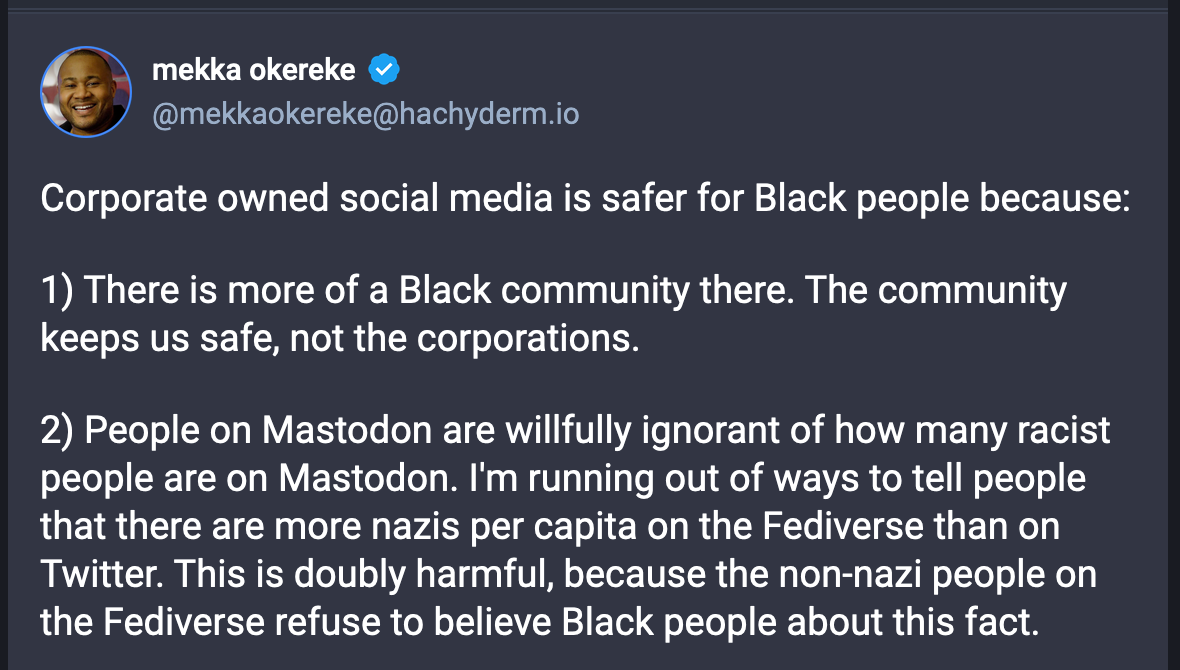
Maybe it is for you ... but for many Black people, it's not. So when you say that it is, you're saying you don't care about their experience.
Stop asking Black people for evidence of anti-Blackness
I know I said this in the main article but it's important enough it bears repeating! Dozens of Black people have shared the evidence repeatedly – including Mekka (who's got several pinned posts worth looking at), and all of the others I've quoted in this article. Believe them!
If you want to see specific examples, do the work yourself to find them rather than expecting Black people to do free, individualized educataion for you. Following the suggestions in section #1 of this article is a good place to start, and the links at the top of the article also have plenty of illustrations.
Appendix: Blocklist resources for moderators
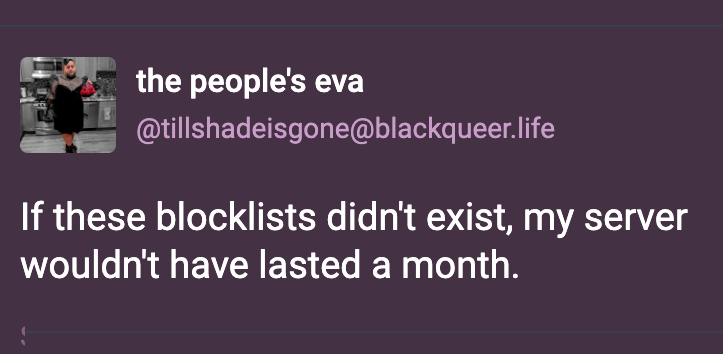
As Blocklists in the fediverse discusses, blocklists can be problematic, but today's fediverse relies on them for safety. Unfortunately, there isn't yet anything close to an automated blocklist solution that provides strong levels of protection to Black people on the fediverse. Still, there are some very useful resources available.
Shared blocklists are files with recommendations of instances to block or limit. Admins can upload blocklists to their instances (although be careful to check that it's the right format), and tools like fediblockhole and IFTAS's new FediCheck can help automate the process to some extent,
Seirdy's Fediverse Blocklists has a thorough discussions of the complexities (including the “trust but verify” section, worth reading no matter what blocklist you're using), and detailed receipts for his FediNuke "worst of the worst" list that are also useful for constructing your own blocklist. Oliphant's Blocklists and IFTAS' Denylist Resources have more.
It's best to use these blocklists as a starting point. New bad actors pop up all the time, and it takes weeks and sometimes even months before they show up on blocklists. So it's important to track the #FediBlock hashtag for updates. #FediBlock was orginally created by Artist Marcia X with additional support from Ginger, and it continues to be the fastest way to find out about new bad actors – it often takes a week or longer for blocklists to update. Of course, anybody can post to a hashtag, so without knowing the reputation of the person calling for a #FediBlock it's hard to know how much credibility to give the recommendation; and it's not always easy way to search the #FediBlock hashtag to see whether specific instances have been mentioned. So it takes a fair amount of time and effort to keep up to date.
IMPORTANT: only use the #FediBlock hashtag for announcements and "receipts" (screenshots, saved archival versions, and links to problematic behavior). Use #FediBlockMeta for discussions about the hashtag. Many instances consider spamming #FediBlock as grounds for defederation – it's interfering with a community defense mechanism, and it's anti-Black. So don't do that! Fortunately, it's usually not a "one strike and you're out" kind of thing except in egregious cases. so if you screw up, edit your post to remove the hashtag, and make sure not to do it again.
Not only that, many of the blocklists incorporate perspectives of large fediverse instances that don't moderate effectively against anti-Blackness, so the shorter blocklists in particular are likely to miss a lot. Blocklists like GardenFence and Seirdy's FediNuke have around 150 instances, and Seirdy's Tier 0 and Oliphant have around 400-450; instances that actively moderate against racism often block well over 1000 instances. So while they're incredibly valuable at blocking the worst-of-the-worst, there's a lot they don't get
Conversely, sometimes instances wind up on blocklists by mistake, or have changed their ways since originally being added but haven't been removed yet; so it's also considered good practice to verify them for yourself (although this can be very time consuming and involve wading through a lot of vile stuff to verify that yes, it is vile).
Instance catalogs are valuable complements to blocklists:
- The Bad Space (aka TBS) is collaboration of communities committed to actively moderating against racism and other kinds of bigotry. As well as a web interaface that makes it easy to look up a specific instance, and an API for programmatic access), which also provides exports that can be used as the basis for blocklists. I recently saw a Black instance admin saying that they used the TBS 40% heat map as a starting point for their blocklists; I decided to do the same on an instance I'm setting up, adding and removing a few instances, and then editing to get it was in the right format for the platform I'm using. It’s possible to talk about The Bad Space without being racist or anti-trans – but it’s not as easy as it sounds discusses TBS – and the resistance in today's fediverse to technology created by a Black person (working with a diverse team of collaborators that includes trans and queer people) that allows people to better protect themselves.
- The Fediseer also has a web interface and API access, and has substantially more information about Lemmy instances than any other option I know of. Compare and contrast: Fediseer, FIRES, and The Bad Space highlights similarities and differences with TBS.
If this all sounds very difficult and time consuming ... you're not wrong. More positively, though, the situation is substantially better than it was two years ago, so let's hope the trend continues!
Update log
Ongoing: typo and grammar fixes, clarifications, additional links, and other minor changes.
- August 2025: add quote from What is Misogynoir? A deeper look into the anti-black racism and sexism that impacts Black Women and Black nonbinary, agender,and gender-variant folks
- July 2025: add quote from Making the impossible possible? Framing confrontations of racism on social media as norm-setting
- August 19 2024: drop "Post Less" from the title of section 2; it continued to get enough pushback that it was a distraction. Also: tweak discussion of non-monolithic communities, add link to social.coop moderators' statement, expand footnote 1
- August 13: revised version published, no longer a draft! Thanks once again to everybody who gave feedback on the draft version.
- August 3-12: discussions on infosec.exchange, lemmy.blahaj.zone, awful.systems, beehaw.org, and lemmy.world, as well as some updates to the published draft.
- August 3: text-only draft published as 4 things white people can do to start making the fediverse less toxic for Black people (DRAFT)
Notes
1 Based on the definition for anti-Blackness in Janvieve Williams Comrie, Antoinette M. Landor, Ph.D., Kwyn Townsend Riley, Jason D. Williamson, Esq.'s chapter on Anti-Blackness and Colorism in the BU Center for Anti Racism Research's 2022 convening on Moving Toward AntiBigotry. I added the words "software and systems" in the first draft, and added "across the world" based on a suggestion in a Bluesky thread.
Quite a few responses to draft versions of this post seemed to think anti-Blackness was a US-only problem. Not so! Natalie Morris' ‘Anti-blackness’ shows how racism can be specifically damaging for black people in Metro is an excellent overview from the UK (where Black people are around 10 times more likely to be stopped and searched by the police than white people). Other examples:
- EU Fundamental Rights Agency (FRA)'s Black people in the EU face ever more racism discusses their 2023 Being Black in the EU report, which notes that racism in the EU remains "pervasive and relentless."
- ANTAR's Racism in Australia notes that "Since European invasion in 1788, race and racism have been foundational to the logic of Australian settler colonialism and the processes by which the lands we now call Australia were stolen and settled," and UN experts say people of African descent are living under a siege of racism in Australia
- Erica Kanesaka's Racist Attachments: Dakko-chan, Black Kitsch, and Kawaii Culture notes that "anti-Black racism is not limited to Western cultures, and histories of colorism, colonialism, and class stratification have led to different formulations of anti-Blackness being found (alongside more local forms of racism) in China, Japan, and Korea."
Of course, anti-Blackness manifests itself somewhat differently in different cultures. Indeed, one common of form of anti-Blackness in Europe, Australia, and Asia is to think it's only an American problem!
2 Terminology note: "Black person" and "Black people" are preferred terminology. Referring to Black people as "Blacks" or "the Blacks" is considered offensive: omitting "person" or "people" denies Black people's humanity, so it's dehumanizing.
Similarly, the B in Black is capitalized in this context because the lowercase word black is a color, not a person. CU Denver's Is the B in Black Capitalized? Yes. and Why we capitalize ‘Black’ (and not ‘white’) in Columbia Journalism Review have more on the capitalization.
3 Moderators responding publicly to problematic posts – calling in, or announcing that a post has been removed and why – can help educate others. It also sends a strong signal that your instance cares about anti-Blackness. Then again, responding publicly can also call more attention to the post, which can sometimes be counter-productive. So there aren't any hard-and-fast guidelines on when it's best to handle it in public or just deal with it in backchannel conversations.
4 Intersectionality is a term coined by Prof. Kimberlé Crenshaw in her classic 1989 law review Demarginalizing the Intersection of Race and Sex: A Black Feminist Critique of Antidiscrimination Doctrine, Feminist Theory and Antiracist Politics to the way that different forms of social inequality or oppression manifest and compound each other. Dr. Patricia Hill Collins' 1990 work Back Feminist Thought: Knowledge, Consciousness, and the Politics of Empowerment, introduced the similar concept of the matrix of domination. Crenshaw's The Urgency of Intersectionality video (2016), and discussion with Jane Coaston inThe intersectionality wars, on Vox (2019), are good introductions; so is Collins' Intersectionalty and Sociology video. The African-American Policy Forum's outstanding Intersectionality Matters! podcast and Under the Black Light video series, and Collins' equally-outstanding Intersectionality as Critical Social Theory, have more.
5 2SLGBTQIA+ is a shorthand for two-sprit, lesbian, gay, gender non-conforming, genderqueer, bi, trans, queer, questioning, intersex, asexual, agender, and others (including non-binary people) who are not straight, cis, and heteronormative. 2S is at the front (following Canadian usage and based on input from two-spirit elders) to highlight that Indigenous and Native people were the First Nations on this land; the + at the end highlights that this isn't an exhaustive list. Julia Serrano's trans, gender, sexuality, and activism glossary has definitions for most of these terms, and discusses the tensions between ever-growing and always incomplete acronyms and more abstract terms like "gender and sexual minorities". OACAS Library Guides' Two-spirit identities page goes into more detail on this often-overlooked intersectional aspect of non-cis identity.
6 The link above goes to a Google Drive doc; diaspora.im admin Fyrfli has a version available here.
7 There are examples of racism against specific ethnic subgroups of white people, for example discrimination against Gypsies, Roma, and Travelers in the UK is considered racism, and includes racism against white Gypsies, Roma, and Travelers.
